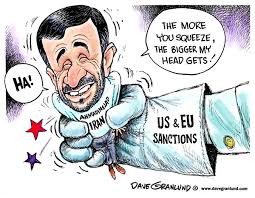By Afshin Molavi

At
the Dubai Strategy Forum five years ago, Iran's Speaker of Parliament Ali
Larijani famously dismissed US efforts to isolate or intimidate Iran over its
nuclear programme by saying: "The US plays baseball. We play chess. Let
them come." The comment was probably uttered with a flick of the wrist and
more than a measure of pride.
Well,
"they" have indeed come, and five years later Iran finds itself
cornered by an elaborate, multi-pronged, gradually escalating diplomatic and
economic squeeze.
In
fact, from the time Mr Larijani made that statement until today, there has been
a methodical squeeze led by the United States with a growing cast of partners,
several of whom have taken the lead in their own right. Those countries that
are not "on board" have been persuaded, pushed, cajoled, intimidated,
sanctioned, shamed and threatened. They have largely fallen in line, with
concessions both big and small.
The
western countries leading the "squeeze" are no slouches when it comes
to chess. Consider the following: Iran's oil and gas sector is in precipitous
decline, hitting production lows not seen in a decade. Because of sanctions,
persuasion and intimidation, no major bank is willing to do deals with Iran, no
major re-insurer will provide cover for Iranian ships and the European Union
will stop all purchases of Iranian crude oil by July 1. Foreign corporations
with healthy profits from Iran operations are packing up and fleeing, and
Iran's own investors and industrialists are sending capital abroad rather than
invest in an uncertain environment at home.
Iran
has become toxic in European investment circles. Even companies that can
legally operate in Iran are too intimidated by the cloud of sanctions, and are
packing up. What about Asia? After all, most of Iran's crude oil goes to East
Asia. Figures for the first quarter of 2012 show that Iran's biggest buyers -
China, Japan, and South Korea - have cut purchases by a combined 30 per cent.
Chinese companies that signed multibillion dollar investment deals in Iran are
dragging their feet. Japanese companies are looking for oil elsewhere. Korean
banking authorities are shackling Iranian banks.
In
Dubai, which has usually been open to Iranian business, the climate has changed
dramatically. Simple banking transactions have become cumbersome and routine
business matters get stuck in red tape. When rumour spread that Emirati banks
would no longer trade in Iranian rials, the currency crashed in Tehran. Today,
most Emirati banks simply refuse to do business with Iranian banks, to
"avoid any headaches down the road", as one bank official put it.
The
story goes on. The SWIFT interbank messaging system made history by expelling
Iran from its service - a first. Lloyds Register, the world's most important
shipping adviser with a presence in every major port, has simply packed up and
left. While Asian insurers are still willing to brave Iran "risk",
none of the major re-insurers will do so, leaving many ships packed with
Iranian crude without cover. Iran's major tanker operator, NITC, routinely
turns off its on-board vessel tracking systems, going "undercover" to
unload their wares. Reports abound of ships idling at sea loaded with Iranian crude.
But
lest we go too far, it must be remembered that the Iran squeeze is still just
that - a squeeze, not a chokehold. Yes, Iranian oil production is down and,
yes, the EU oil import ban, and Asian refiners' cutbacks, will hit Iran's
bottom line. All told, it will probably mean that Iran will need to find new
buyers for about one third of its oil. Even if it is unable to do so, it will
still be able to sell two thirds of its oil. As one of the top five oil
exporters, this is still a significant amount, up to $100 billion (Dh367
billion) last year. Losing one third of revenues is not a small matter, but it
is not an existential threat.
So,
where does that leave Iran and the P5 + 1 talks over its nuclear programme, to
be picked up again in Baghdad on May 23? Clearly, Iran is hurting, but it is
not drowning. The P 5 + 1 - the UN Security Council members plus Germany -
should be cognisant of this fact. Iran wants the squeeze to end. By all
accounts, Iran's chief nuclear negotiator, Saeed Jalili, made that clear to
Lady Catherine Ashton, the EU foreign policy chief who led the P 5 + 1 side in
the recent Istanbul talks.
It
will be critical for Lady Ashton to come to the table with clear incentives,
and a road map for a face-saving exit for Tehran. Too much political capital
has been invested in the nuclear programme for Supreme Leader Ayatollah Ali
Khamenei to simply slink away and retreat. But if a technical agreement on
uranium enrichment with verifiable inspections could be reached, which Iran can
sell to its public as a "victory", the P 5 +1 and Iran might end up
with the most common result between advanced chess players: a draw.
We
are not there yet. There are more moves to be played, and Iran's king is
increasingly cornered in the chess match. But there are no time limits on this
match-up and, to be sure, this is no game. A checkmate will not mean a clean
handshake and a goodbye. It could turn out to be dangerous. Playing for the
"public" draw, while staying true to the P 5 +1 red lines, might be
the best strategy going forward.
-This commentary was published first in The National on 15/05/2012
-Afshin Molavi is a senior adviser at Oxford Analytica and a senior fellow at the New America Foundation
-Afshin Molavi is a senior adviser at Oxford Analytica and a senior fellow at the New America Foundation
No comments:
Post a Comment